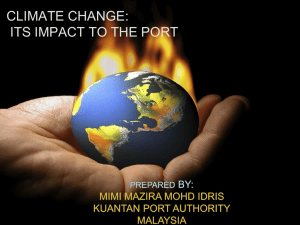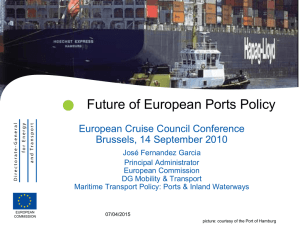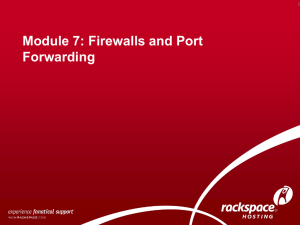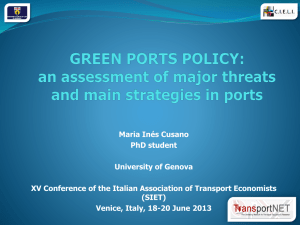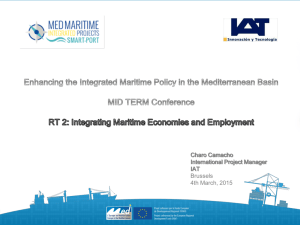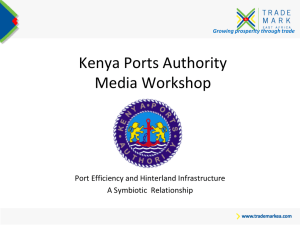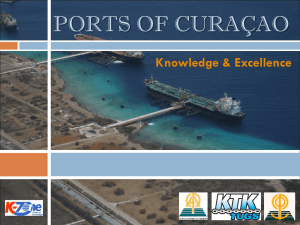Cruise Activities in MedCruise ports
advertisement
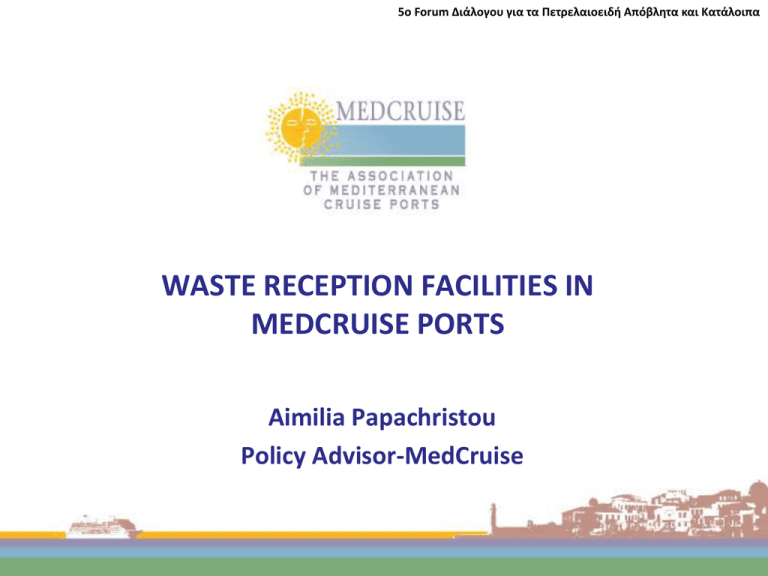
5ο Forum Διάλογου για τα Πετρελαιοειδή Απόβλητα και Κατάλοιπα WASTE RECEPTION FACILITIES IN MEDCRUISE PORTS Aimilia Papachristou Policy Advisor-MedCruise PRESENTING MEDCRUISE MedCruise: Bringing together ports in the Med & adjoining seas MedCruise member traffic 2013 27,02 millions passenger movements 14.428 cruise calls 70 port members (>100 ports), 32 associates 20 countries Source: Cruise Activities in MedCruise ports (2014) A Growing Membership empowers the Association Cruise Passenger Movements Evolution in MedCruise ports +3,96% 30 25,99 27,02 25 21,86 20 15 10 54 53 58 63 65 67 67 68 68 68 68 68 69 68 2002 2003 2004 2005 2006 2007 2008 2009 2010 2011 2012 2013 0 2001 5 2000 Total Passenger Movements (in millions) +23,6% Source: Cruise Activities in MedCruise ports (2014) MedCruise Objectives • Promote cruise destinations and ports in the Med and adjoining seas. • Collaborate on: – Training – Environment – Policies & Operational issues • Develop quality passenger shipping experiences: – Preserve diversity and authenticity. – Manage congestion – Shared return: local communities, ships, passengers. IMPORTANCE OF ENVIRONMENTAL MANAGEMENT What do Med ports do? • We know that Environmental management is challenging but essential (“licence to operate and to grow”) • We work together and commit to actions – Professional cooperation (The MedCruise Professional Development Course) – Assisting tools – Proactive voluntary self-regulation • Added value for both the sector and individual ports • Trends provide inspiration for further improvement Note: Environmental priorities change over time Source: ESPO, various years ASSISTING TOOLS: INVOLVEMENT IN SUSTAINABLE CRUISE RESEARCH Med Cruise ports care: Project Overview Waste reception facilities • MedCruise partnered with other actors to map the existing waste reception facilities in Mediterranean ports • Cruise lines will soon know where and how they can discharge waste • Ports will learn which are the best practices Why? • Rules (MARPOL73/78 Annex V) • Principles for waste management • Waste Hierarchy INTEGRATED SOLID WASTE MANAGEMENT SYSTEM IS A COMPLEX ISSUE At Sea Ashore • • • • • • • • • • • • • • • • • Storage Segregation Reuse Treatment Incinerators Recycling Energy Recovery Reception Storage Segregation Treatment Recycling Re-use Compost Biogas Energy recovery Transfer to Centralized Station Med Cruise Ports care: Project Overview Waste Management MedCruise partnered with other actors to identify concrete actions within the framework of the European Directive on waste, the socalled 3Rs: Reduction, Reuse, Recycling and revised Marpol Annex V. Packaging Bio-waste Paper Waste prevention (reduction, minimization) Reuse Recycle Energy recovery Disposal Define a plan for the recovery or re-use of Re-use the economic value of 30% 90% Define a plan for the recovery or re-use of 40% Extracts from data collected as part of MedCruise ports participation at the Sustainable Development project WASTE RECEPTION FACILITIES AT MEDCRUISE PORTS GARBAGE RECEPTION FACILITIES (GRF) Location at the port 9% 9% At all berths At most berths 82% At some berths At only one berth GARBAGE RECEPTION FACILITIES (GRF) Working hours of GRF at the port 4.2% 24 hours, 7 days per week 24 hours, 5 days per week 95.8% Business hours only, 7 days per week GARBAGE RECEPTION FACILITIES per type of carbage Plastics Truck Container Tank Forklift Vessel Cages Barge Skip Dumpster Plastic IBCs Barrels Packages Drum Bags Pipes ✓ ✓ ✓ ✓ ✓ ✓ ✓ ✓ Food Wastes Domestic Cooking Incinerator Operational Cargo Wastes Oils Ashes Wastes Residues ✓ ✓ ✓ ✓ ✓ ✓ ✓ ✓ ✓ ✓ ✓ ✓ ✓ ✓ ✓ ✓ ✓ ✓ ✓ ✓ ✓ ✓ ✓ ✓ ✓ Animal Carcass Fishing Gear ✓ ✓ ✓ ✓ ✓ ✓ ✓ ✓ ✓ ✓ ✓ ✓ ✓ ✓ ✓ ✓ ✓ ✓ ✓ ✓ ✓ ✓ ✓ ✓ ✓ ✓ ✓ ✓ ✓ ✓ Procedures followed for garbage reception from the Waste Declaration Form till the garbage reception Agent informs Port Authorities on the ship call Waste Declaration Form before arrival (~24h) Terminal and/ or Port Authority are notified Main requirements for garbage reception in terms of packaging & labelling • Different garbages, different packaging • Segregation, Separation – – – – Paper, Glass, Plastic, Metal: Bulk, Boxes, Containers Wood, Textile: Containers and Bags Food: Bags Hazardous waste: • ADR (Accord européen relative au transport international des marchandises Dangereuses par Route) and • IMDG (International Maritime Dangerous Goods), based on Recommendations on the Transport of Dangerous Goods”, issued by the UN Main reasons for not accepting garbage reception Reason Delays in delivering Lack of garbage disposal request Inappropriate package Improper or no segregation Out of scope (e.g. ashes, batteries etc) Large quantities Hazardous garbage All above reasons No. 1 3 6 3 3 1 2 1 SERVICES OFFERED PRIOR TO GARBAGE DISPOSAL Does the port provide storage inside its area? If yes, for which product types? Product type % A. Plastics 38% B. Food wastes 33% C. Domestic wastes 38% D. Cooking oil 28% E. Incinerator ashes 22% F. Operational wastes 33% G. Cargo residues 38% H. Animal carcass(es) 5,5% I. Fishing gear 11% SERVICES OFFERED PRIOR TO GARBAGE DISPOSAL Does the port offer segregation services? 34.8% Yes No 65.2% Garbage disposal methods used in the port 85.7% 90.0% 80.0% 71.4% 70.0% 60.0% 50.0% 40.0% 28.6% 30.0% 21.4% 21.4% 21.4% Re Use Energy Recovery Biological Reprocessing 20.0% 10.0% 0.0% Recycling Landfill Incineration Proprietary status of the port reception facilities N=17 16 14 12 10 8 6 4 2 0 1 3 1 5 11 8 5 4 6 2 2 1 1 Recycling Plant Incineration Plant Biological processing Plant Energy recovery Plant Other Public-Private Private Storage areas Public Fee collection scheme applied at the port Charges per m3 57.1% 60.0% 50.0% 42.9% 40.0% 30.0% 19.0% 20.0% 10.0% 0.0% Direct Indirect (fees are applied irrespectively of actual use of the facilities as in Directive 2000/59/EC) Other Other: • Combined system (direct and indirect fees) • The service is provided by specialized companies, no fees applied by port Exemptions rules applied at the port • Based on: – – – – – The ship’s tonnage Regularity of calls Frequency of calls Days of berth at port National laws (e.x. Spain: Royal Decrees 1381/2002 and 1084/2009) Authorities responsible for procedures & controlling proper execution of waste reception & handling services Authority No. Port Authority 8 Coast Guard 4 Harbour Master Provincial Directorate of Environment and Urbanism 2 Ministry of Environment 2 Environment and planning authorities 1 Local Municipality 2 1 N=20 Remember why all these - Illegal to discharge waste into the sea - Develop Corporate Image of friends of the environment - Passenger feeling moral consumers - In short: Recovery has an economic value Thank you Aimilia Papachristou Policy Advisor www.medcruise.com

